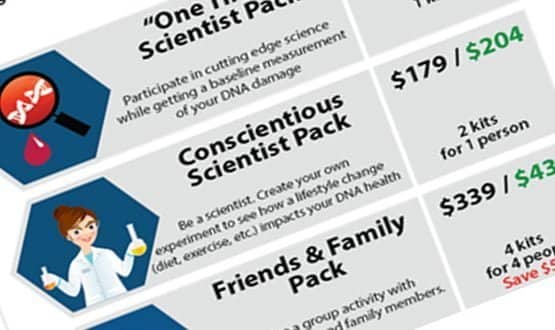Power to the people: on intracellular introspection
- 18 February 2014

Want to know if your DNA has been ‘damaged by your life style’? Get a self-testing pack for $124.
Want to know if you can reverse any changes that result from your life style? Get two, and test yourself after you have changed your diet, stopped drinking or started running to see if you have reversed the ‘damage’.
Want to ‘track and hack’ your family’s DNA? Take the ‘friends and family’ option for $459 and test them all.
The science bit
There’s so much going on here it’s enough to make your head explode. First. the science: the kits test one of the gene loci (P53) associated with the epigenetic changes that can result from environmental and life style factors.
Epigenetic changes are the means by which a whole range of environmental factors change subsequent gene expression. For example, the Adverse Childhood Event study showed that children who experienced >5 serious and on-going events such as abuse or parental violence were likely to die some 20 years sooner than children experiencing none of these.
These effects are associated with specific epigenetic changes (though these occur at many other places than just P53) that are thought to occur as a result of these significant life style events and which subsequently affect susceptibility to disease.
The hope here is that if you can reverse the epigenetic changes induced by the environment you might normalise your risk profile.
Second, this is a simply genetic version of all those self-improvement books like ‘How to Win Friends and Influence People’ – but this time it isn’t about understanding than men are from Mars and women from Venus.
It’s about – allegedly – cleaning yourself up at the genetic level since all that excess living you did when you were younger may have left your genome a tad gunky.
Third, this is crowd sourcing taken to a new level (the image is taken from the ad on Indiegogo the crowd funding platform).
It’s not just that the $149 is rather more than the cost of the test itself (the rest helps sustain the wider project). It’s about crowd-sourcing the science behind the test.
No one knows much about reversing epigenetic changes so here’s your chance to help create new knowledge. By paying your money you become a ‘scientist’ helping to uncover what P53 does and just how easy or hard it is to reverse epigenetic changes.
High tech for all?
Finally, there’s the fact that there’s none of your ethics committee here. Not a sniff of the National Institute for Health and Care Excellence. This is a direct mediation between the citizen and high technology.
The analogy isn’t between patient and the NHS, the analogy is more Virgin and the punters it is offering to spin into space for a mere $250,000.
With Exogen, you get to consume the same kind of high tech, edge of your seat, science: but for just $149. The promise is about enabling us to get down and boogie with the very essence of our software-driven, meat-machine nature.
The most mundane of the many lessons here is that the genetics revolution is subject its own version of Moore’s Law – except its going 30% faster: the cost of sequencing DNA is halving roughly every 12 months.
The societal manifestations of this have yet to manifest themselves because the genetic equivalent of Microsoft, Apple and Google are still to be born. Without these intermediaries it’s hard for ordinary citizens to turn DNA codons into human meaning, so the societal implications of this revolution are still to come.
Maybe Exogen is right. Maybe in the future the only way making sense of the petabytes of information (genetic and other) that are beginning to flow is to recruit us all to the cause.
If there is always more knowledge outside the room than inside, always more wisdom in the crowd than in the committee, then perhaps this is the future.
Perhaps this is a truer, madder, deeper version of care.data, a world where the knowledge doesn’t reside on the web but is the web.
Measure everything at the level of the person – location, friends, activity, conversations, FitBit data, Nectar card, credit rating, genetics, epigenetics – and perhaps the web will begin to dance with meta-level patterns made emergent by the magic of big data.
If so, this will be the last emancipation of the market as the invisible hand begins to be articulated not by money but by the totality of personal information derived from the interactions of billions of autonomous, linked individuals.
Hold on for a rocky ride
Perhaps. But for the present we are just left with jangling nerves, the signature tune of our times. Sometimes, the world just seems to be running out of control.
Why is it that getting stuff to run on Mr Lansley’s Patent Bespoke NHS Operating System is a nightmare but with a casual wave of your Visa card you can have your P53 result grinning away right there next to you on the sofa?
This dilemma is more than tired old public service vs shiny new Amazon. It is that the operating system of society is shifting from hierarchy to web, from planned to emergent.
Last week I was listening to Alyson McGregor from Altogether Better, a community engagement social enterprise employing five people, that has managed to recruit 18,000 local people as health champions. In one project in Sheffield, 40% have gone on to find a job.
It made me wonder whether Alyson and her team have some magic ingredient or whether, perhaps, this change from hierarchy to web is helping her along.
We are all beginning to swim in the sea of peer-to-peer relationships mediated by social media. Does the frequent experience of interacting with strangers on Twitter or Facebook make it easier to link up via real life interactions such as those created by Altogether Better?
Who knows. But I find it a more hopeful game plan for the dilemmas of the present than getting my P53 tested.


Paul Hodgkin
Paul Hodgkin is founder and chair of Patient Opinion, a website on which patients, service users, carers and staff can share their stories of care across the UK. Patient Opinion is a not-for-profit social enterprise based in Sheffield.
Until 2011, Paul also worked as a GP and has published widely including in the BMJ, British Journal of General Practice and the Guardian and the Independent. Follow him on Twitter @paulhodgkin.





